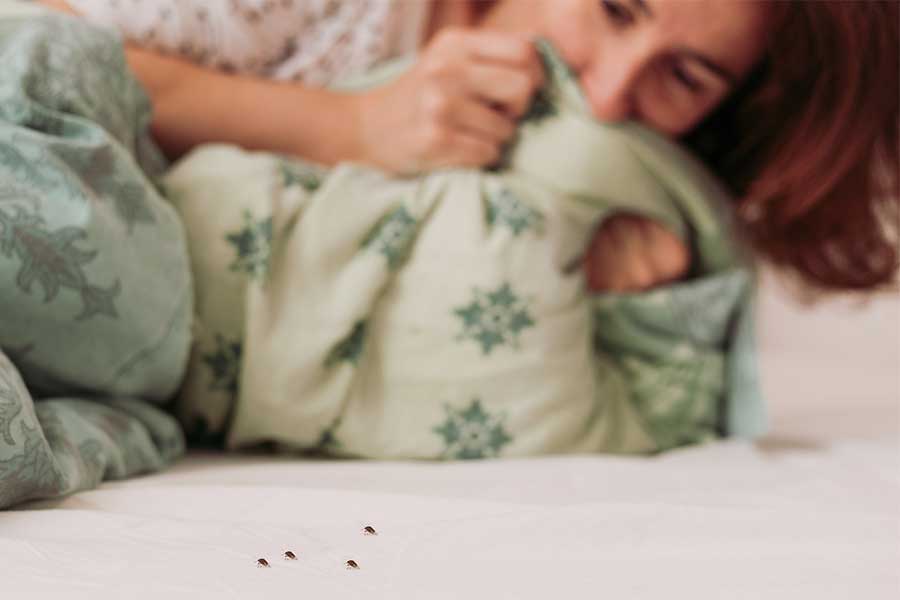
Absolutely! Bed bugs are notorious for their bites, which happen mostly while you’re asleep. These pests feed during the night, and although you might not feel the bite at the time, it can lead to red, itchy welts later on.
While bed bugs aren’t known to transmit dangerous diseases, they still pose a couple of health risks. The most troubling aspect of a bed bug infestation is undoubtedly their bites. These bites can sometimes lead to secondary skin infections, and in some cases, individuals may experience allergic reactions.
Where Do Bed Bugs Bite?
Bed bugs will bite any area of your body that’s exposed while you sleep, including your arms, legs, hands, feet, and even your neck. Their bites often appear in lines or zigzag patterns. But what about your face? Unfortunately, yes, they can bite your face too.
However, while bites on the face are possible, you don’t have to worry about bed bugs crawling into your nose, mouth, or ears. These pests prefer to feed on the surface of your skin and retreat quickly after their meal. After a bed bug bite, people may experience the following symptoms:
- Clusters of small red welts
- Severe itching
- Allergic reactions
- Insomnia
- Skin irritation
- Anxiety from the infestation
When Do Bed Bugs Bite?
Bed bugs are most active during the night, especially when their victims are sound asleep. They typically feed while you’re resting, and their bites are usually painless, so you won’t even wake up. A bed bug will feed for up to ten minutes before it’s fully engorged and then retreat to its hiding place.
These pests are indeed nocturnal, with their activity peaking between 2 a.m. and 5 a.m. However, they’re adaptable and will adjust their feeding schedule to anytime you’re at rest.
Are Bed Bug Bites Dangerous?
Though they’re pretty unpleasant, bed bug bites are not considered medically dangerous. They aren’t known to transmit any diseases, but it’s still important to treat their bites properly to ensure they heal well. Some people don’t experience any symptoms after being bitten, while others may notice red, itchy spots. In more severe cases, rashes or welts might develop.
Do You Have a Bed Bug Problem? We Can Help.
Click the button below to leave your information & we'll be in touch in an hour or less.
Bed Bug Bites vs. Flea Bites vs. Mosquito Bites
While bed bug, flea, and mosquito bites may have similar symptoms, there are a couple of differences that can help you tell which insect is bugging you:
- Size: When it comes to size, mosquito and flea bites are fairly similar, both resulting in small, itchy red bumps. Bed bug bites, though, are usually larger, more noticeable, and more irritating, often demanding more attention due to their discomfort.
- Appearance: The look of these bites can help you identify them. Flea bites usually show up as clusters of small, red marks around the lower legs and ankles, appearing in a somewhat random pattern. Bed bug bites, however, often appear in a straight line or zigzag pattern on the torso, arms, or legs. Mosquito bites are typically swollen, itchy bumps that can pop up anywhere on exposed skin.
- Pain: Bed bug bites often go unnoticed at first, with symptoms like itching and discomfort appearing hours later. On the other hand, flea bites cause a sharp pain immediately, and mosquito bites are instantly recognizable due to their painful sting.
- Risk: The health risks associated with these bites shouldn’t be overlooked. Mosquito bites are particularly concerning because they can transmit serious diseases like malaria and the Zika virus. While flea and bed bug bites are generally less dangerous, they can lead to secondary infections if the affected areas are not treated properly and are scratched excessively.
How Long Do Bed Bug Bites Last?
Once they appear, bed bug bites can linger for one to two weeks if allowed to heal properly. However, for those who tend to have stronger reactions to insect bites, the healing process might take three weeks or even longer. To speed up recovery, it’s crucial to avoid scratching the bites and let them heal naturally. In rare cases, some people may experience severe reactions, including allergic responses, which should be addressed by a medical professional right away.
What to Do About Bed Bug Bites
Taking a comprehensive approach is key—thoroughly cleaning your home, regularly washing your bedding, and sealing off potential hiding spots for these pests are all important steps.
However, the most effective way to tackle an infestation is to hire a professional bed bug control expert. These specialists not only bring the right treatments but also a strategic plan to completely eliminate bed bugs from your environment.
Back to Bed Bug Identification